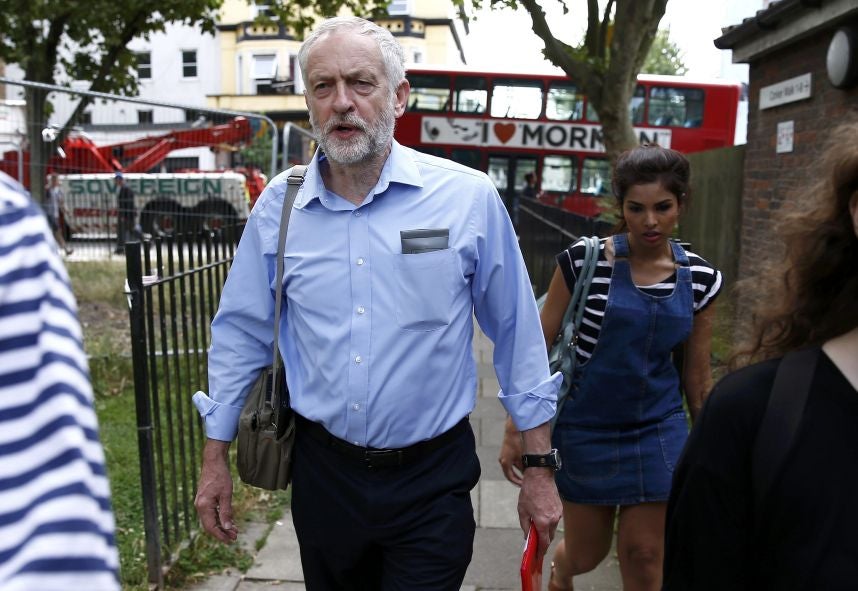Jeremy Corbyn can stay on Labour leadership ballot, High Court rules
Corbyn: 'This has been a waste of time and resources when our party should be focused on holding the Government to account'

Jeremy Corbyn will not have to seek nominations from his MPs to proceed with his leadership bid, after a High Court judge ruled in his favour.
It comes after the wealthy Labour donor Michael Foster brought the case against Mr Corbyn. He was challenging the ruling that Mr Corbyn, as the incumbent, had the automatic right to be on the ballot paper in a leadership election, whereas any challenger would have to collect nominations from at least 50 Labour MPs or MEPs.
Mr Corbyn said he welcomed the decision by the High Court to "respect the democracy" of the Labour Party. "This has been a waste of time and resources when our party should be focused on holding the Government to account," he added.
"There should have been no question of the right of half a million Labour Party members to choose their own leader being overturned. If anything, the aim should be to expand the number of voters in this election.
"I hope all candidates and supporters will reject any attempt to prolong this process, and that we can now proceed with the election in a comradely and respectful manner."
Iain McNicol, General Secretary of the Labour Party, added that he was "delighted" with the decision by the High Court to uphold the authority of the party's governing body. “We will continue with the leadership election as agreed by the NEC [National Executive Committee],” he added.
Mr Foster's lawyers told Mr Justice Foskett at the High Court that the Labour Party's rules were "misapplied" when its NEC voted by a majority of 18 to 14 that Mr Corbyn should automatically go on the ballot paper without needing to obtain the backing of 20 per cent of Labour MPs and MEPs.
Owen Smith, who is running against Mr Corbyn for the Labour leadership, earlier told BBC News that he thought Mr Corbyn should “always” be on the ballot paper. “I thought it was the right decision by the NEC to put him on the ballot. I think the mood in the party would be really angry if a judge interfered in whether Jeremy is on the ballot,” he added.
However, when asked whether he would encourage other MPs in the Parliamentary Labour Party to help ensure Mr Corbyn’s place on the ballot paper, Mr Smith said it was "not for me to tell them what to do". He continued: “I would like to contest this versus Jeremy, and I would like to win the arguments versus Jeremy so, yes, I would like Jeremy to be in the contest. But it would be for other MPs, if we got to that set or circumstances, to make their own decisions. It’s not for me to tell them what to do.”
Many believed it would have been difficult for Mr Corbyn to secure the nominations needed – just 40 MPs backed him while 172 voted against him in a no-confidence motion last month.
In the judgment, Mr Justice Foskett said: “I repeat as firmly and unequivocally as I can that the resolution of the narrow legal issue I have been asked to decide is wholly uninfluenced by which side will be pleased with the outcome.
“Mr Henderson suggested it is possible that those responsible for the drafting of the rules never foresaw that the situation that has arisen recently might arise. It is not for me to speculate, but if he is right, it is not for the court to try to rewrite the rules to provide a solution. The responsibility for that lies elsewhere.”

Speaking after the judgment, Mr Foster's QC, Gavin Millar, argued that it was clear the meaning given to the rules by the majority on the NEC on 12 July was wrong, and it was not a “reasonable” interpretation. But Mark Henderson, counsel for Mr McNicol, said the rules were not ambiguous or open to serious doubt, and Martin Westgate QC for Mr Corbyn argued that the NEC's conclusion was “plainly right”.
He added: “In any case, the conclusion reached by the NEC is entitled to great respect and the court should not interfere with it.” Ballot papers will now be sent out on 22 August, with the result of the leadership contest announced at a special conference in Liverpool on 24 September.
Join our commenting forum
Join thought-provoking conversations, follow other Independent readers and see their replies
Comments